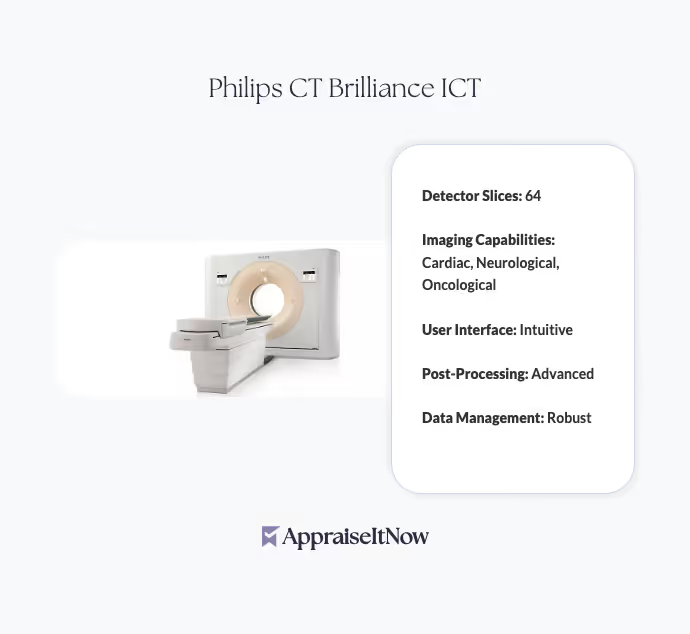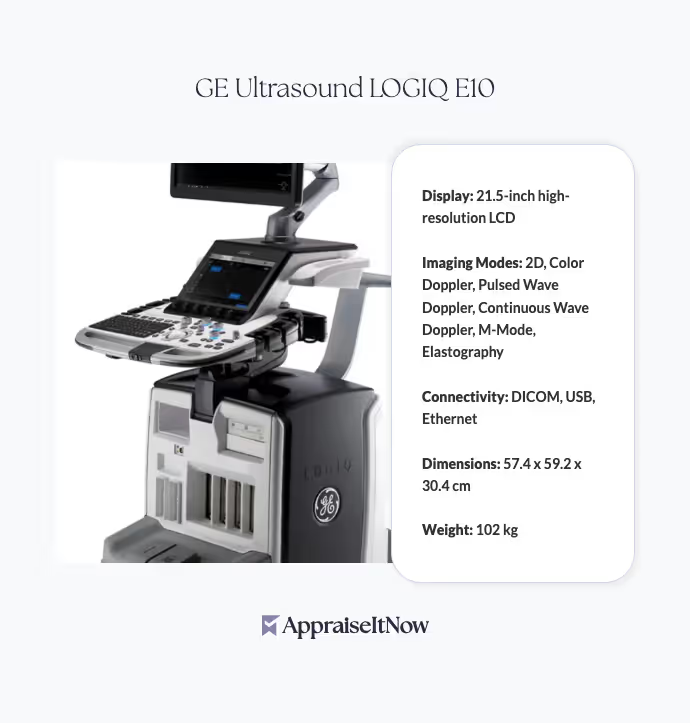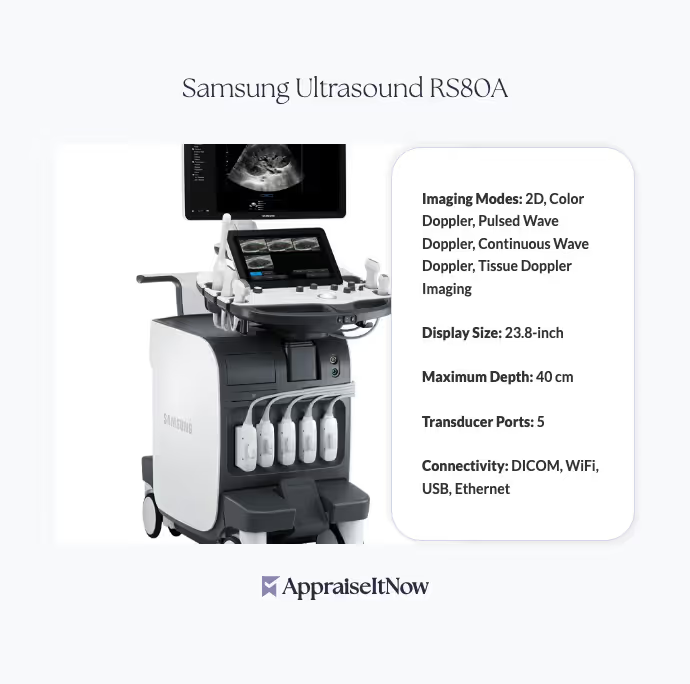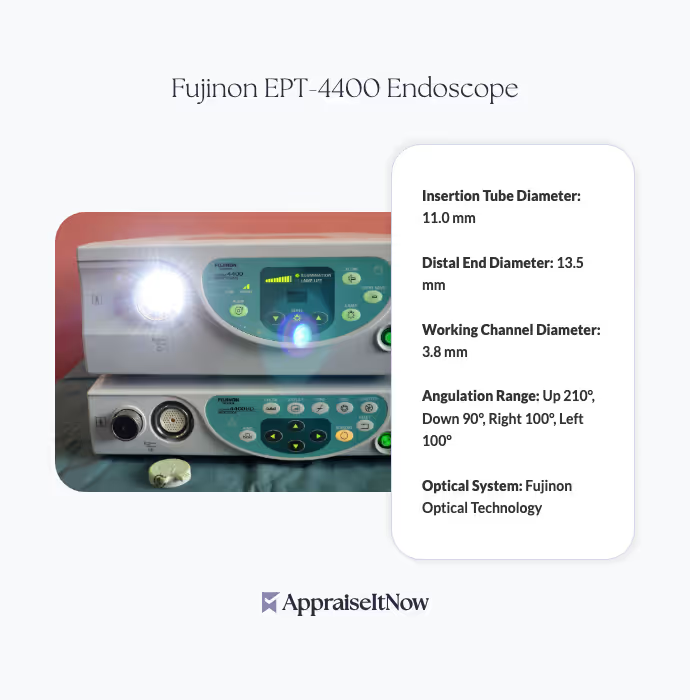<h1>How to Get Your Philips CT Brilliance ICT Appraised</h1>
<p>The Philips CT Brilliance ICT represents a significant investment in medical imaging technology, with current market values ranging from <strong>$150,000 to $220,000</strong> depending on age, condition, and configuration. Whether you're evaluating a device for purchase, sale, facility upgrades, or insurance purposes, understanding the appraisal process ensures you receive an accurate valuation that reflects today's market dynamics and the equipment's true diagnostic capabilities.</p>
<h2>Understanding Your Philips CT Brilliance ICT's Market Value</h2>
<p>The Philips CT Brilliance ICT stands as a state-of-the-art computed tomography system, first introduced in 2006 and deployed across leading healthcare facilities worldwide. Its 64-slice detector technology enables high-resolution imaging for cardiac, neurological, and oncological applications—making it one of the most versatile diagnostic imaging platforms available. The equipment's advanced post-processing capabilities and robust data management features add substantial value to healthcare operations, which appraisers factor directly into valuations.</p>
<p>What makes the Brilliance ICT command premium prices in the secondary market? Its reputation for delivering exceptional image quality at rapid scan speeds creates consistent demand from healthcare facilities upgrading imaging departments. The system's intuitive user interface has also aged well compared to competitors, meaning well-maintained examples retain stronger values than technologically outdated alternatives. When you're evaluating <a href="/types/medical-equipment">medical equipment</a> for strategic decisions, the Brilliance ICT's longevity and clinical reliability make it a compelling subject for professional valuation.</p>
<div class="callout tip"><p><strong>Value Driver</strong></p>
<p>Equipment maintained with comprehensive service records and documented PM (preventive maintenance) history typically appraised 15-25% higher than comparable units lacking documentation.</p></div>
<h2>Factors That Significantly Influence Appraisal Value</h2>
<p>Several specific elements determine where your Philips CT Brilliance ICT falls within the $150,000-$220,000 range. Understanding these factors helps you prepare effectively for the appraisal process and potentially maximize your equipment's valuation.</p>
<p><strong>Age and scan count</strong> represent primary value determinants. A system installed in 2008 with 50,000 total scans commands different value than an identical 2006 model with 200,000 scans. Professional appraisers examine the DICOM (Digital Imaging and Communications in Medicine) system logs to verify actual usage patterns, as declared scan counts sometimes underestimate actual equipment wear. The detector condition—critical to image quality—degrades predictably with volume, making this one of the most scrutinized elements during evaluation.</p>
<p>Your system's service history directly impacts appraised value. Detector type specifications, current software version, and availability of replacement parts all factor into valuations. Equipment running outdated software that no longer receives manufacturer support typically sees 10-20% value reductions compared to recently updated systems. Conversely, newly serviced components or recent detector replacements can justify premium pricing within the established range.</p>
<p>Geographic demand creates secondary value variations. Facilities in underserved rural markets may command slightly lower prices than identical units in metropolitan areas with higher healthcare facility density. Appraiser expertise becomes crucial here—they understand regional market dynamics when conducting comparative analysis across your equipment's true valuation geography.</p>
<div class="callout note"><p><strong>Documentation Matters</strong></p>
<p>Comprehensive service logs, PM records, license keys, detector serial numbers, and DICOM compatibility verification should be compiled before appraisal engagement.</p></div>
<h2>USPAP-Compliant Appraisal Standards and Report Types</h2>
<p>Professional appraisals for the Philips CT Brilliance ICT follow <strong>Uniform Standards of Professional Appraisal Practice (USPAP)</strong> guidelines, ensuring defensibility and universal acceptance by lenders, insurers, and legal entities. Understanding the different report types available helps you select the format best suited to your specific circumstances.</p>
<p><strong>Market value appraisals</strong> establish what a willing buyer would pay a willing seller in an arm's-length transaction—the most common request for facility upgrades or ownership transitions. <strong>Fair market value reports</strong> specifically support insurance coverage by documenting replacement cost should equipment suffer loss or damage. <strong>Liquidation valuations</strong> provide realistic pricing if rapid equipment sale becomes necessary, typically 20-30% below fair market value to reflect transaction speed constraints.</p>
<p>For healthcare facilities, <strong>replacement cost appraisals</strong> document what it would cost to replace current imaging capability—often significantly exceeding the Brilliance ICT's secondary market value when factoring in installation, training, and operational downtime. This report type supports insurance planning and capital budgeting conversations with administrative leadership. When working with lenders or investors, certified appraisers prepare valuations meeting their specific documentation requirements, ensuring smooth transaction processing.</p>
<p>Professional appraisers specializing in <a href="/types/lab-equipment">lab equipment</a> and medical imaging systems understand these nuanced distinctions and deliver reports that serve your intended purpose. AppraiseItNow's network includes certified experts holding credentials from AAA, ISA, ASA, CAGA, and AMEA—professional designations recognized throughout the medical equipment valuation industry.</p>
<h2>Required Documentation and Preparation Steps</h2>
<p>Assembling comprehensive documentation before your appraisal engagement significantly streamlines the process and often supports higher valuations. Appraisers require specific materials to conduct thorough evaluations and produce defensible reports.</p>
<p>Service logs and preventive maintenance records form the foundation of equipment appraisals. These documents verify the Brilliance ICT's operational history, revealing maintenance consistency and any significant repairs or component replacements. Ideally, compile a decade of records if available, as this historical perspective demonstrates long-term equipment reliability. License keys and software version documentation verify current system capability and support status—equipment running obsolete software versions faces valuation adjustments.</p>
<p>Detector serial numbers require verification alongside purchase documentation confirming original acquisition details. Appraisers use these identifiers to research comparable sales and establish original manufacturing specifications. Photographs from multiple angles—including control panels, cable connections, and detector assembly—provide visual condition documentation. High-resolution images documenting any wear, scratches, or component modifications help appraisers assess physical condition without requiring site visits for routine valuations.</p>
<p>DICOM compatibility certification, calibration certificates, and any regulatory compliance documentation (FDA clearance numbers, state licensing requirements) add credibility to your appraisal. Healthcare facilities increasingly require such documentation when evaluating <a href="/types/equipment-and-machinery">equipment and machinery</a> purchases, making these materials valuable during transaction negotiations.</p>
<h2>Service Contracts, Software Licenses, and Certification Value</h2>
<p>Does your Philips CT Brilliance ICT include active service contracts or software licenses? These ancillary assets can meaningfully increase appraised value. Equipment with comprehensive manufacturer maintenance agreements typically commands 5-10% premiums over identical units relying on independent service providers. Active software licenses, particularly for advanced imaging protocols or reconstruction algorithms, provide quantifiable value that appraisers incorporate into final valuations.</p>
<p>Calibration certificates from accredited facilities validate equipment performance to industry standards. Recent calibration records—ideally within the past 12 months—demonstrate that imaging quality meets specifications, supporting higher valuations. Some healthcare facilities require calibration verification before equipment acquisition, making current certification either essential or significantly value-enhancing depending on local regulatory requirements.</p>
<p>Extended warranties or service contracts including parts and labor typically add 3-8% to base equipment value, depending on remaining contract duration and coverage scope. Appraisers distinguish between comprehensive manufacturer support agreements versus limited plans covering emergency repair only, as this affects the calculated premium.</p>
<div class="callout tip"><p><strong>Maximize Value</strong></p>
<p>Transfer service contracts and update software to the latest supported version before appraisal. These improvements often cost less than the valuation premium they generate.</p></div>
<h2>Appraisal Report Types and Expected Turnaround</h2>
<p>The typical turnaround time for Philips CT Brilliance ICT appraisals ranges from <strong>5-15 business days</strong> depending on whether you select remote photo-based valuation or require on-site inspection. Remote photo appraisals—increasingly common for equipment in stable condition with complete documentation—cost significantly less while delivering equally defensible USPAP-compliant reports. This approach works particularly well when you have comprehensive service records and current facility documentation.</p>
<p>On-site inspections become necessary when equipment condition raises questions or when your situation involves complex valuations requiring expert hands-on assessment. Professional appraisers conduct thorough mechanical evaluations, verify detector function, and assess physical condition during facility visits. While more time-intensive and costly, on-site appraisals provide maximum documentation rigor for litigation support, insurance disputes, or estate valuations requiring unassailable professional credibility.</p>
<p>USPAP standards ensure all appraisals—regardless of delivery method—meet accepted professional practices. Your appraiser provides detailed methodology documentation, comparable market analysis, and condition assessment supporting the final valuation. This transparency means you understand exactly how your Philips CT Brilliance ICT's value was determined, supporting informed decisions about equipment transactions or insurance coverage adjustments.</p>
<h2>Acceptance by Lenders, Insurers, and Tax Authorities</h2>
<p>Professional appraisals from credentialed experts enjoy broad acceptance across financial institutions, insurance providers, and tax authorities. Lenders evaluating equipment-backed financing typically require USPAP-compliant valuations before approving loans secured by medical imaging equipment. Insurance companies demand certified appraisals to establish replacement cost coverage limits, ensuring policyholders receive adequate reimbursement if loss occurs.</p>
<p>For tax and donation purposes, the IRS accepts appraisals from qualified professionals with demonstrated equipment expertise. Healthcare facilities donating Philips CT Brilliance ICT systems to charitable organizations or medical training programs require certified valuations supporting charitable deductions. Tax authorities specifically scrutinize medical equipment valuations given their significant financial impact, making appraiser credentials and methodology documentation absolutely essential.</p>
<p>When handling healthcare facility documentation and patient-related materials, professional appraisers follow strict HIPAA protocols and maintain patient confidentiality. This specialized knowledge demonstrates why working with appraisers experienced in medical equipment valuation—rather than generalist professionals—produces more defensible, legally compliant results. Organizations like AppraiseItNow train appraisers in healthcare-specific confidentiality requirements and liability precautions essential when accessing facility records.</p>
<h2>Market Comparables and Geographic Demand Considerations</h2>
<p>Establishing accurate value requires analyzing comparable Philips CT Brilliance ICT sales within your geographic market. Professional appraisers access proprietary databases tracking secondary equipment markets, reviewing actual sales, asking prices, and time-on-market data for similar systems. The geographic component proves crucial because medical equipment demand varies substantially by region—metropolitan areas with multiple competing healthcare systems typically support higher equipment values than rural markets with limited buyer bases.</p>
<p>Your equipment's specific configuration—detector specifications, available imaging protocols, software packages included—narrows the comparable sales pool significantly. A fully equipped Brilliance ICT with advanced cardiac imaging modules commands premium pricing versus a basic configuration lacking specialized protocols. Appraisers identify truly comparable equipment by matching these technical specifications, ensuring that valuation comparables reflect your actual system's capabilities.</p>
<p>Obsolescence factors into modern valuations in ways that generalist appraisers often overlook. Regulatory environment changes—such as updated radiation dose standards or new reimbursement requirements—can shift equipment demand. Appraisers experienced in healthcare valuations understand these regulatory dynamics and adjust market analysis accordingly. Similarly, upcoming technology transitions sometimes suppress demand for equipment nearing end-of-life cycles, an adjustment that specialized appraisers incorporate into valuations.</p>
<div class="callout note"><p><strong>Regional Impact</strong></p>
<p>Identical Philips CT Brilliance ICT systems may appraise 10-15% differently depending on regional healthcare facility density, local reimbursement environments, and existing equipment inventory within your geographic market.</p></div>
<h2>Professional Appraisal Costs and Value Considerations</h2>
<p>Professional Philips CT Brilliance ICT appraisals typically cost between <strong>$2,000-$5,000</strong> for comprehensive USPAP-compliant reports, representing 1.5-3% of estimated equipment value. This investment generates returns exceeding costs through more accurate valuations, defensible documentation, and improved transaction outcomes. Insurance companies often recover premium savings through more accurate replacement cost determination. Sellers using certified appraisals typically achieve 5-15% higher transaction prices compared to non-appraised equipment sales, demonstrating clear financial justification.</p>
<p>When selecting an appraiser, ensure they maintain professional liability insurance and demonstrate specific experience appraising medical imaging equipment. Credentials from recognized professional organizations like the American Society of Appraisers (ASA) or International Society of Appraisers (ISA) verify training in USPAP standards and ethical practices. Request references from healthcare facilities they've recently appraised, confirming their expertise aligns with your specific equipment and circumstances.</p>
<p>The investment in professional appraisal services proves particularly valuable when equipment valuations impact significant business decisions—facility purchases, insurance coverage adjustments, equipment lease terms, or estate distribution. Professional documentation protects all parties and ensures valuations withstand scrutiny from third parties including insurers, lenders, or tax authorities. Appraisers serve as objective third parties, insulating you from bias accusations that sometimes plague in-house valuations or informal price estimates.</p>
<h2>Summary: Why Professional Appraisal Matters for Your Philips CT Brilliance ICT</h2>
<p>Your Philips CT Brilliance ICT represents a substantial asset worthy of professional valuation expertise. Whether you're evaluating facility equipment for insurance, planning equipment transactions, or determining appropriate carrying values for accounting purposes, certified appraisals from experts experienced in <a href="/blog/establishing-value-how-to-determine-the-worth-of-medical-equipment">medical equipment</a> valuation deliver the accuracy, defensibility, and documentation your situation requires.</p>
<p>The current market for Brilliance ICT systems shows stable demand within the $150,000-$220,000 range, though individual equipment values vary significantly based on age, condition, service history, and specific configuration. Professional appraisers navigate these nuances, delivering valuations that reflect true market conditions rather than published catalog prices or oversimplified depreciation formulas. By assembling comprehensive documentation, understanding your appraisal needs, and engaging qualified professionals, you ensure accurate valuation that supports informed decision-making about this valuable medical imaging asset.</p>
<div class="callout note"><p><strong>Key Takeaway</strong></p>
<p>A certified appraisal of your Philips CT Brilliance ICT provides defensible documentation for insurance, transaction, and accounting purposes—ensuring you understand both the equipment's diagnostic value and its precise market worth in today's evolving healthcare landscape.</p></div>
















